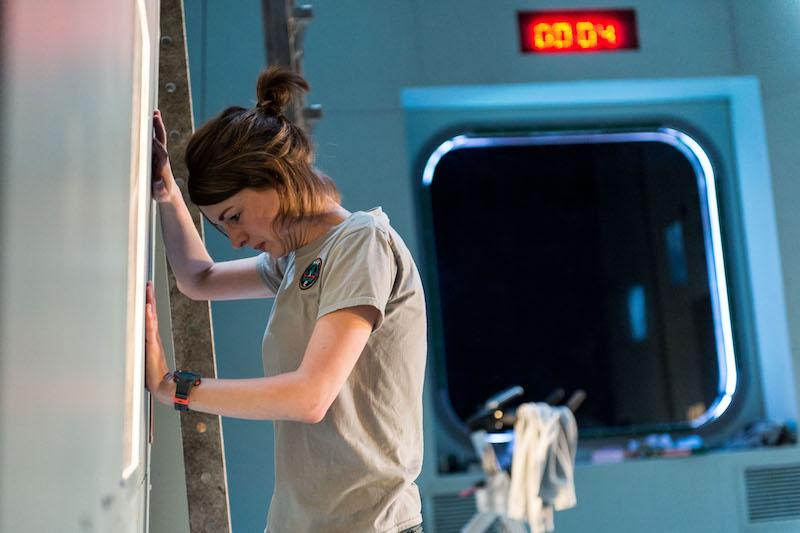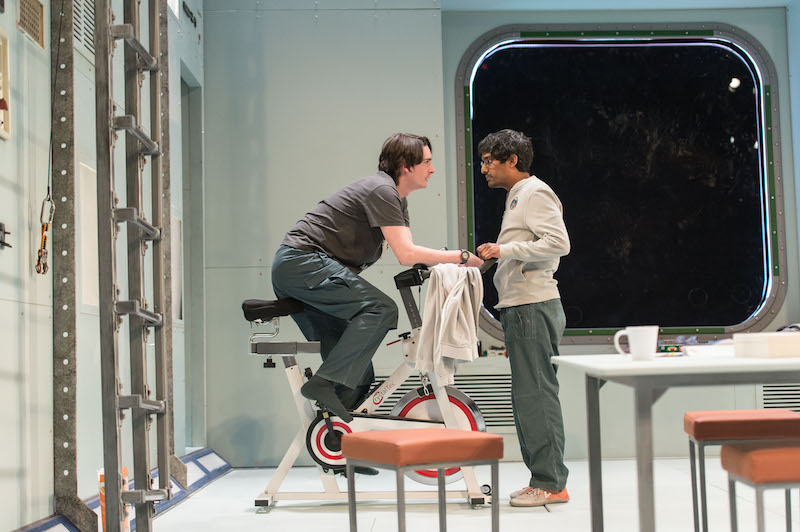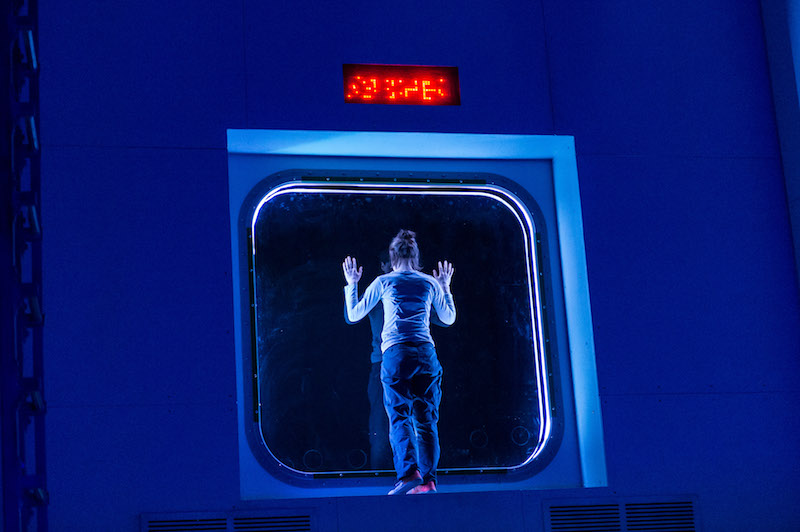X, Royal Court Theatre | reviews, news & interviews
X, Royal Court Theatre
X, Royal Court Theatre
Alistair McDowall’s journey through time and space is beguiling and maddening

In 2014, Pomona stormed the Orange Tree, turning the previously staid venue into a place of both lauded theatre revolution and disgruntled walkouts. Could Alistair McDowall repeat the feat at the more progressive Royal Court?
X should certainly prove as divisive, with a labyrinthine, genre-hopping structure even less resistant to easy answers. Pinning this play down is like trying to decipher clues to a cryptic crossword whose grid has just morphed into a fish. The entire first half is dismantled by the second, innocuous exchanges shape-shift repeatedly, and we lose our anchors, one by one, along with McDowall’s characters. If ultimately a more cerebral than visceral experience, it’s a singular leap into the unknown.
We’re in deep, dark space, stranded with a team of scientists on Pluto – originally designated Planet X, and since downgraded to dwarf planet. The Americans have snapped up Mars, leaving us Brits with icy nothingness at the edge of the Solar System. The research base has lost contact with the ecologically devastated Earth, and there’s nothing to do but wait. Jittery Gilda (Jessica Raine), thrust unwillingly into leadership, attempts to marshal her team: belligerent Clark (James Harkness), analytical Cole (Rudi Dharmalingam, pictured below with Harkness) and pragmatic Mattie (Ria Zmitrowicz). But veteran Ray (Darrell D’Silva) believes they’re not alone out here. What’s more alarming: invasion or isolation?
 So far, so Kubrickian sci-fi, though already jostling for space with claustrophobic student flatshare and workplace comedy (there’s even a tax avoidance joke – who knew a futuristic space play could be topical?). Three weeks’ radio silence stretches into months, maybe years. The digital clock is glitching, it’s always dark on Pluto, and ceaseless tedium becomes a prickling horror on this base designed to live forever. Cole futilely tries to create an algorithm for time – one of many “x”s; Clark, who touched the past when he felt one of the last living trees as a boy, now believes only in the present; Mattie masturbates three times a day to maintain some kind of structure. Glinda eats breakfast cereal at all hours, and, when she can’t sleep, listens to a recording of the nothingness outside – somehow more real than the computerised nothingness within.
So far, so Kubrickian sci-fi, though already jostling for space with claustrophobic student flatshare and workplace comedy (there’s even a tax avoidance joke – who knew a futuristic space play could be topical?). Three weeks’ radio silence stretches into months, maybe years. The digital clock is glitching, it’s always dark on Pluto, and ceaseless tedium becomes a prickling horror on this base designed to live forever. Cole futilely tries to create an algorithm for time – one of many “x”s; Clark, who touched the past when he felt one of the last living trees as a boy, now believes only in the present; Mattie masturbates three times a day to maintain some kind of structure. Glinda eats breakfast cereal at all hours, and, when she can’t sleep, listens to a recording of the nothingness outside – somehow more real than the computerised nothingness within.
McDowall’s dystopian vision is dominated by that loss of the organic and tangible, the slow creep of machines, life experienced through 1s and 0s. Is something real only if we can hold it, smell it, taste it? Do we need that to retain a sense of self, or can we rely on memory, mythology and emotional response? McDowall undercuts everything we see and hear, but his version of Florian Zeller’s temporal slipperiness relies on too much exposition-heavy and studied set-up. It’s meatier in retrospect, but that only works if you’re viewing the play on a loop (appropriate, perhaps). Like the crew, we are left waiting, indefinitely.
 The tonal lurches, elliptical characterisation and linguistic deconstruction create an engagement challenge that Vicky Featherstone’s production can’t quite overcome. Raine’s Gilda (pictured above left), anxious, prickly, forever chewing on her hair, suffers a very British breakdown – “We’re all a bit fraught!” she snaps, with admirable understatement – but because Gilda is ill-defined, her loss of self is less affecting. The supporting cast is similarly hamstrung, and none entirely nail the quirky comedy, but D’Silva sells Ray’s grief for a lost world, Dharmalingam and Clark unravel convincingly, and Zmitrowicz and Amber Fernée are, as required, both natural and inscrutable.
The tonal lurches, elliptical characterisation and linguistic deconstruction create an engagement challenge that Vicky Featherstone’s production can’t quite overcome. Raine’s Gilda (pictured above left), anxious, prickly, forever chewing on her hair, suffers a very British breakdown – “We’re all a bit fraught!” she snaps, with admirable understatement – but because Gilda is ill-defined, her loss of self is less affecting. The supporting cast is similarly hamstrung, and none entirely nail the quirky comedy, but D’Silva sells Ray’s grief for a lost world, Dharmalingam and Clark unravel convincingly, and Zmitrowicz and Amber Fernée are, as required, both natural and inscrutable.
References to parenthood, love, sickness and mortality are more thought-provoking than moving, but there are moments that haunt: a child’s voice; a dangling pair of legs; a painted window; the demonic glow of unreliable red digits; the desperate assertion that “You don’t forget something like that”. Merle Hensel’s greenish-grey, queasily off-kilter pod is dominated by the yawning mouth of a window to blackness, and Nick Powell’s nerve-jangling soundscape feels like the internal scream of someone tumbling into that void. Surrendering to it, rather than battling for a linear reading, makes this a more rewarding experience, but though McDowall boldly goes where no play has gone before, he may not take all his audience with him.
rating
Explore topics
Share this article
The future of Arts Journalism
You can stop theartsdesk.com closing!
We urgently need financing to survive. Our fundraising drive has thus far raised £49,000 but we need to reach £100,000 or we will be forced to close. Please contribute here: https://gofund.me/c3f6033d
And if you can forward this information to anyone who might assist, we’d be grateful.

Subscribe to theartsdesk.com
Thank you for continuing to read our work on theartsdesk.com. For unlimited access to every article in its entirety, including our archive of more than 15,000 pieces, we're asking for £5 per month or £40 per year. We feel it's a very good deal, and hope you do too.
To take a subscription now simply click here.
And if you're looking for that extra gift for a friend or family member, why not treat them to a theartsdesk.com gift subscription?
more Theatre
 Othello, Theatre Royal, Haymarket review - a surprising mix of stateliness and ironic humour
David Harewood and Toby Jones at odds
Othello, Theatre Royal, Haymarket review - a surprising mix of stateliness and ironic humour
David Harewood and Toby Jones at odds
 Macbeth, RSC, Stratford review - Glaswegian gangs and ghoulies prove gripping
Sam Heughan's Macbeth cannot quite find a home in a mobster pub
Macbeth, RSC, Stratford review - Glaswegian gangs and ghoulies prove gripping
Sam Heughan's Macbeth cannot quite find a home in a mobster pub
 The Line of Beauty, Almeida Theatre review - the 80s revisited in theatrically ravishing form
Alan Hollinghurst novel is cunningly filleted, very finely acted
The Line of Beauty, Almeida Theatre review - the 80s revisited in theatrically ravishing form
Alan Hollinghurst novel is cunningly filleted, very finely acted
 Wendy & Peter Pan, Barbican Theatre review - mixed bag of panto and comic play, turned up to 11
The RSC adaptation is aimed at children, though all will thrill to its spectacle
Wendy & Peter Pan, Barbican Theatre review - mixed bag of panto and comic play, turned up to 11
The RSC adaptation is aimed at children, though all will thrill to its spectacle
 Hedda, Orange Tree Theatre review - a monument reimagined, perhaps even improved
Scandinavian masterpiece transplanted into a London reeling from the ravages of war
Hedda, Orange Tree Theatre review - a monument reimagined, perhaps even improved
Scandinavian masterpiece transplanted into a London reeling from the ravages of war
 The Assembled Parties, Hampstead review - a rarity, a well-made play delivered straight
Witty but poignant tribute to the strength of family ties as all around disintegrates
The Assembled Parties, Hampstead review - a rarity, a well-made play delivered straight
Witty but poignant tribute to the strength of family ties as all around disintegrates
 Mary Page Marlowe, Old Vic review - a starry portrait of a splintered life
Tracy Letts's Off Broadway play makes a shimmeringly powerful London debut
Mary Page Marlowe, Old Vic review - a starry portrait of a splintered life
Tracy Letts's Off Broadway play makes a shimmeringly powerful London debut
 Little Brother, Soho Theatre review - light, bright but emotionally true
This Verity Bargate Award-winning dramedy is entertaining as well as thought provoking
Little Brother, Soho Theatre review - light, bright but emotionally true
This Verity Bargate Award-winning dramedy is entertaining as well as thought provoking
 The Unbelievers, Royal Court Theatre - grimly compelling, powerfully performed
Nick Payne's new play is amongst his best
The Unbelievers, Royal Court Theatre - grimly compelling, powerfully performed
Nick Payne's new play is amongst his best
 The Maids, Donmar Warehouse review - vibrant cast lost in a spectacular-looking fever dream
Kip Williams revises Genet, with little gained in the update except eye-popping visuals
The Maids, Donmar Warehouse review - vibrant cast lost in a spectacular-looking fever dream
Kip Williams revises Genet, with little gained in the update except eye-popping visuals
 Ragdoll, Jermyn Street Theatre review - compelling and emotionally truthful
Katherine Moar returns with a Patty Hearst-inspired follow up to her debut hit 'Farm Hall'
Ragdoll, Jermyn Street Theatre review - compelling and emotionally truthful
Katherine Moar returns with a Patty Hearst-inspired follow up to her debut hit 'Farm Hall'
 Troilus and Cressida, Globe Theatre review - a 'problem play' with added problems
Raucous and carnivalesque, but also ugly and incomprehensible
Troilus and Cressida, Globe Theatre review - a 'problem play' with added problems
Raucous and carnivalesque, but also ugly and incomprehensible

Add comment